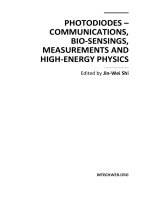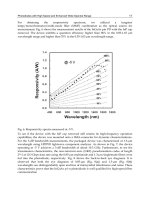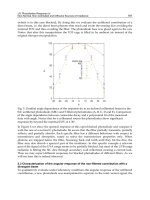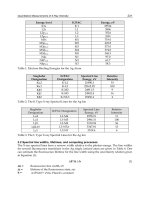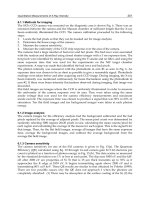Bioluminescence Recent Advances in Oceanic Measurements and Laboratory Applications Part 14 doc
Bạn đang xem bản rút gọn của tài liệu. Xem và tải ngay bản đầy đủ của tài liệu tại đây (162.17 KB, 5 trang )
Bioluminescence – Recent Advances in Oceanic Measurements and Laboratory Applications
186
Oil was used to prevent the bacterial environment from drying. Glass with an amino group
modification (MAS coated glass slides, Matsunami Glass Ind., Ltd.) was used for the adsorption. The
glass was soaked in a marine-broth-based bacterial suspension overnight. A measurement was
performed using a luminescence meter (GENE LIGHT GL-200S, Microtec Nichion).
Fig. 16. Effect of irradiation to the luminescence from cells adsorbed on a glass surface.
4. Conclusion
Oscillation in the bacterial bioluminescence mode is strongly dependent on the amount of
oxygen supply to the solution. There is no clear relationship between the DO concentration
and luminescence intensity, perhaps due to the consumption of oxygen by both the
luminescence and respiration. The oscillation occurred at a very low DO concentration, and,
when the time course of cell density was plotted with the same timescale as the
luminescence intensity, the cell growth rate seemed to decrease after the strong
luminescence. The fluorescence ability of LumP seemed constant during the oscillation
period, but, at the beginning and at the end, it seemed to decrease. The characterisation of
luminescence from a smaller number of cells would be necessary for further investigation of
oscillation, considering that the suspension is a mixture of cell groups with a variety of cell
phases.
Oscillation in Bacterial Bioluminescence
187
5. Acknowledgments
The author thanks Dr. Hajime Karatani of the Kyoto Institute of Technology for his
participation in discussions and Shoji Yamada, Kenshin Tamura, Shingo Kuriyama, Mika
Mochizuki, and Hajime Kimoto for their assistance with the experiments.
6. References
Aivasidis, A.; Melidis, P.; Georgiou, D. (2002). Use of a microbial sensor: a new approach to
the measurement of inhibitory effects on the microbial activity of activated sludge.
Bioprocess and Biosystems Engineering, Vol. 25, No. 1, (April 2002), pp. 29-33, ISSN
1615-7591
Balny, C. & Hastings, J. W. (1975). Fluorescence and Bioluminescence of Bacterial Luciferase
Intermediates. Biochemistry , Vol. 14, No. 21, (October 1975), pp. 4719-4723, ISSN
0006-2960
Chang, IS.; Moon, H.; Jang, JK. & Kim, BH. (2005). Improvement of a microbial fuel cell
performance as a BOD sensor using respiratory inhibitors. Biosensors and
Bioelectronics , Vol. 20, No. 9, (March 2005), pp. 1856-1859, ISSN 0956-5663
Davila, D.; Esquivel, JP.; Sabate, N. & Mas, J. (2011). Silicon-based microfabricated microbial
fuel cell toxicity sensor. Biosensors and Bioelectronics , Vol. 26, No. 5, (October 2010),
pp. 2426-2430, ISSN 0956-5663
Dobrescu, R. & Purcarea, VI. (2011). Emergence, self-organization and morphogenesis in
biological structures. Journal of medicine and life, Vol. 4, No. 1, (February 2011), pp.
82-90, ISSN 1844-122x
Eckstein, JW.; Cho, KW.; Colepicolo, P.; Ghisla, S.; Hastings, JW. & Wilson, T. (1990). A time-
dependent bacterial bioluminescence emission spectrum in an in vitro single
turnover system: energy transfer alone cannot account for the yellow emission of
Vibrio fischeri Y-1. Proceedings of the National Academy of Sciences U S A, Vol. 87, No.
4, (February 1990), pp. 1466-1470, ISSN 0027-8424
Girott, S.; Ferri, E. N.; Fumo, M. G.; & Maiolini, E. (2008). Monitoring of environmental
pollutants by bioluminescent bacteria. Analytica Chimica Acta , Vol. 608, No. 1,
(February 2008), pp. 2-29, ISSN 0003-2670
Hastings, J. W. (1996). Chemistries and Colors of Bioluminescent Reactions: a Review. Gene,
Vol. 173, No. 1, (July 1995), pp. 5-11, ISSN 0378-1119
Kang. KH.; Jang. JK.; Pham. TH.; Moon. H.; Chang. IS. & Kim, BH. (2003). A microbial fuel
cell with improved cathode reaction as a low biochemical oxygen demand sensor.
Biotechnology Letters , Vol. 25, No. 16, (August 2003), pp. 1357-1361, ISSN 0141-5492
Karatani, H.; Izuta, T. & Hirayama, S. (2007). Relationship between the redox change in
yellow fluorescent protein of Vibrio fischeri strain Y1 and the reversible change in
color of bioluminescence in vitro. Photochemical and Photobiological Sciences, Vol. 6,
No. 5, (January 2007), pp. 566-570, ISSN 1474-905X
Karatani, H.; Matsumoto, S.; Miyata, K.; Yoshizawa, S.; Suhama, Y. & Hirayama, S. (2006).
Bioluminescence color modulation of Vibrio fischeri strain Y1 coupled with alterable
levels of endogenous yellow fluorescent protein and its fluorescence imaging.
Bioluminescence – Recent Advances in Oceanic Measurements and Laboratory Applications
188
Photochemistry and Photobiology, Vol. 82, No. 2, (March 2006), pp. 587-592, ISSN
0031-8655
Karatani, H.; Yoshizawa, S. & Hirayama, S. (2004). Oxygen triggering reversible modulation
of Vibrio fischeri strain Y1 bioluminescence in vivo. Photochemistry and Photobiology,
Vol. 79, No. 1, (January 2004), pp. 120-125, ISSN 0031-8655
Kenkre, V. M.; &, Kumar, N. (2008). Nonlinearity in bacterial population dynamics: Proposal
for experiments for the observation of abrupt transitions in patches. Proceedings of
the National Academy of Sciences U S A, Vol. 105, No. 48, (November 2008), pp.
18752-18757, ISSN 0027-8424
Kim, M.; Hyun, MS.; Gadd, GM.; Kim, GT.; Lee, SJ. & Kim, HJ. (2009). Membrane-electrode
assembly enhances performance of a microbial fuel cell type biological oxygen
demand sensor. Environmental Technology, Vol. 30, No. 4, (April 2009), pp. 329-336,
ISSN 0959-3330
Kogure, H.; Kawasaki, S.; Nakajima, K.; Sakai, N.; Futase, K.; Inatsu, Y.; Bari, ML.; Isshiki, K.
& Kawamoto, S. (2005). Development of a novel microbial sensor with baker's yeast
cells for monitoring temperature control during cold food chain. Journal of Food
Protection , Vol. 68, No. 1, (January 2005), pp. 182-186, ISSN 0362-028X
Kurfurst, M.; Ghisla, S. & Hastings, J. W. (1983). Bioluminescence Emission from the
Reaction of Luciferase-Flavin Mononucleotide Radical with O2-
・ Biochemistry ,
Vol. 22, No. 7, (March 1983), pp. 1521-1525, ISSN 0006-2960
Lee, J.; Wang, Y. Y. & Gibson, B. G. (1991). Electronic Excitation Transfer in the Complex of
Lumazine Protein with Bacterial Bioluminescence Intermediates. Biochemistry , Vol.
30, No. 28, (July 1991), pp. 6825-6835 ISSN 0006-2960
Moon, H.; Chang, IS.; Kang, KH.; Jang, JK. & Kim, BH. (2004). Improving the dynamic
response of a mediator-less microbial fuel cell as a biochemical oxygen demand
(BOD) sensor. Biotechnology Letters , Vol. 26, No. 22, (November 2004), pp. 1717-
1721, ISSN 0141-5492
Mounier, J.; Monnet, C.; Vallaeys, T.; Arditi, R.; Sarthou, AS.; Helias, A. & Irlinger, F. (2008).
Microbial interactions within a cheese microbial community. Applied and
Environmental Microbiology, Vol. 74, No. 1, (November 2007), pp. 172-181, ISSN
0099-2240
Pooley DT. (2011). Bacterial bioluminescence, bioelectromagnetics and function.
Photochemistry and Photobiology, Vol. 87, No. 2, (March 2011), pp. 324-328, ISSN
0031-8655
Raushel, F. M. & Baldwin, T. O. (1989). Proposed Mechanism for the Bacterial
Bioluminescence Reaction Involving a Dioxirane Intermediate. Biochemical and
Biophysical Research Communications, Vol. 164, No. 3, (November 1989), pp. 1137-
1142 ISSN 0006-291X
Rees, J. F., B. de Wergifosse, O. Noiset, M. Dubuisson, B. Janssens and E. M. Thompson;
(1998). The Origins of Marine Bioluminescence: Turning Oxygen Defense
Mechanisms into Deep-Sea Communication Tools, The Journal of Experimental
Biology, Vol. 201, No. 8, (April 1998), pp. 1211-1221, ISSN 1010-061X
Oscillation in Bacterial Bioluminescence
189
Sasaki, S.; Okamoto, T. & Fujii, T., (2009). Bioluminescence intensity difference observed in
luminous bacteria groups with different motility. Letters in Applied Microbiology,
Vol. 48, No. 3, (March 2009), pp. 313-317, ISSN 0266-8254
Sasaki, S.; Mori, Y.; Ogawa, M. & Funatsuka, S. (2010). Spatio-temporal control of bacterial
suspension luminescence using a PDMS cell, Journal of Chemical Engineering of Japan,
Vol. 43, No. 11, (August 2010), pp. 960-965, ISSN 0021-9592
Sato, Y. & Sasaki, S. (2006). Control of the Bioluminescence Starting Time by Inoculated Cell
Density. Analytical Sciences, Vol. 22, No. 9, (September 2006), pp. 1237-1239, ISSN
0910-6340
Sato, Y. & Sasaki, S. (2008). Observation of Oscillation in Bacterial Luminescence. Analytical
Sciences, Vol. 24, No. 3, (January 2008), pp. 423-425, ISSN 0910-6340
Sato, Y; Shimizu S; Ohtaki A; Noguchi K; Miyatake H; Dohmae N; Sasaki S; Odaka M &
Yohda M. (2010). Crystal structures of the lumazine protein from Photobacterium
kishitanii in complexes with the authentic chromophore, 6,7-dimethyl- 8-(1'-D-
ribityl) lumazine, and its analogues, riboflavin and flavin mononucleotide, at high
resolution., Journal of Bacteriology, Vol. 192, No. 1, (January 2010), pp. 127-33, ISSN
0021-9193
Septer, AN.; Bose, JL.; Dunn, AK. & Stabb, EV. (2010). FNR-mediated regulation of
bioluminescence and anaerobic respiration in the light-organ symbiont Vibrio
fischeri. FEMS Microbiology Letters, Vol. 306, No. 1, (February 2010), pp. 72-81, ISSN
0378-1097
Shirazy, N. H.; Ranjbar, B.; Hosseinkhani, S.; Khalifeh, K.; Madvar; A. R. & Naderi-Manesh,
H. (2007). Critical Role of Glu175 on Stability and Folding of Bacterial Luciferase:
Stopped-Flow Fluorescence Study. Journal of Biochemistry and Molecular Biology, Vol.
40, No. 4, (July 2007), pp. 453-458, ISSN 1225-8687
Szpilewska, H., A. Czyz and G. Wegrzyn; (2003). Experimental Evidence for the
Physiological Role of Bacterial Luciferase in the Protection of Cells Against
Oxidative Stress, Current Microbiology, Vol. 47, No. 5, (November 2003), pp. 379-382
ISSN 0343-8651
Timmins, G. S., S. K. Jackson and H. M. Swartz; (2001). The Evolution of Bioluminescent
Oxygen Consumption as an Ancient Oxygen Detoxification Mechanism, Journal of
Molecular Evolution, Vol. 52, No. 4, (April 2001), pp. 321-332, ISSN 0022-2844
Tsuchiya, HM.; Drake, JF.; Jost, JL. & Fredrickson, AG. (1972). Predator-prey interactions of
Dictyostelium discoideum and Escherichia coli in continuous culture. Journal of
Bacteriology, Vol. 110, No. 3, (June 1972), pp. 1147-1153, ISSN 0021-9193
Tu, S. C.; Lei B.; Liu M.; Tang, C. K. & Jeffers C. (2000). Probing the Mechanisms of the
Biological Intermolecular Transfer of Reduced Flavin. The Journal of Nutrition, Vol.
130, No. 2, (February 2000), pp. 331-332, ISSN 0022-3166
Urbanczyk, H.; Ast, JC. & Dunlap, PV. (2011). Phylogeny, genomics, and symbiosis of
Photobacterium. FEMS Microbiology Reviews, Vol. 35, No. 2, (September 2010), pp.
324-342, ISSN 0168-6445
Vaiopoulou, E.; Melidis, P.; Kampragou, E. & Aivasidis, A. (2005). On-line load monitoring
of wastewaters with a respirographic microbial sensor. Biosensors and Bioelectronics ,
Vol. 21, No. 2, (December 2004), pp. 365-371, ISSN 0956-5663
Bioluminescence – Recent Advances in Oceanic Measurements and Laboratory Applications
190
Varon, M. & Zeigler, BP. (1978). Bacterial predator-prey interaction at low prey density.
Applied and Environmental Microbiology, Vol. 36, No. 1, (July 1978), pp. 11-17, ISSN
0099-2240
Wu, BM.; Subbarao, KV. & Qin, QM. (2008). Nonlinear colony extension of Sclerotinia minor
and S. sclerotiorum. Mycologia , Vol. 100, No. 6, (November 2008), pp. 902-910, ISSN
0027-5514
Yano, Y.; Numata, M.; Hachiya, H.; Ito, S.; Masadome, T.; Ohkubo, S.; Asano, Y. & Imato, T.
(2001). Application of a microbial sensor to the quality control of meat freshness.
Talanta , Vol. 54, No. 2, (April 2001), pp. 255-262, ISSN 0039-9140
